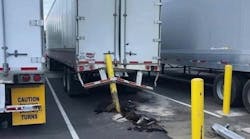There's little doubt that safety is the number-one concern at Usher Transport. Headquartered in Louisville, KY, the tank carrier hauls petroleum products such as gasoline, diesel, aviation fuel, bulk oil and solvents. On the chemical side of the house, Usher transports corrosives, oxidizers, dry bulk, and flammables.
“The challenge of operating productively is greater than ever today,” says Bill Usher Jr., president. “Economic issues are tasking us to do more with less, and an ongoing challenge is driver availability. At the same time, customer needs have to be met. Regardless, we remain as focused as ever on having the right strategy in place to ensure efficiency and most of all safety.”
Central to Usher Transport’s approach is to specify its 300 power units and 380 tankers with some of the latest safety technologies.
“All of our newest tractors and trailers have roll stability systems,” says Keith Judd, director of maintenance. “We also spec Eaton UltraShift Plus automated transmissions, and every vehicle is equipped with LED lights to make them more visible. These types of specifications are important to our loss control initiatives.”
Efforts to field safe equipment dovetail with Usher Transport’s operations management initiatives, notes David Guess, director of safety. “For example, we post loss control data at each terminal so everyone can see trends and realize the value of our safety efforts,” he says. “We’ve also developed and implemented an operations training program that focuses on making sure our operations staff is up to speed on our safety initiatives.”
BUILDING QUALITY
Usher Transport’s operations training is a 15-module program called “Six Steps to Near Perfect Quality” that takes nearly one year to complete. Designed for operations team leaders and quality control personnel, the course focuses on minimizing the need for quality control through effective quality planning and prevention.
Along with safety, Usher Transport is focused on customer service, productivity and efficiency in its operations and, especially, in its equipment. One unique challenge it is meeting, for example, involves hauls of lube oil into Quebec. The product, which is 120 deg. F when loaded, would thicken en route and cling to the sides of the tank barrel, making it difficult to offload completely.
“Not only was it usual for a standard 6,000-gal. aluminum trailer to return with 300 to 500 gals. of oil inside, the thicker product took much longer to deliver, cutting into allowable on-duty time for drivers,” Guess reports. “However, we solved this particular problem with the help of Polar Tank Trailer, which designed a 43-ft. MC 406 insulated aluminum model that maintains enough warmth for the product to flow easily at the delivery location. We now operate about 25 of those trailers.” Usher Transport is also very weight conscious when it comes to equipment.
“Productivity is boosted by hauling more product,” Keith Judd says, “so we’re spec’ing lightweight drums, aluminum wheels, and wide-base drive and trailer tires to offset the added weight of newer SCR engines, DEF tanks, and fluid. On our newest Freightliner Cascadia tractors, we’re offsetting added weight by shedding at least 100 lbs. per wheel position on drive and trailer axles.”
Usher Transport primarily handles short and midrange time-sensitive hauls, usually within a 500-mi. radius of one of its terminals. Its customers range from Fortune 500 chemical and oil companies to a range of smaller distributors and jobbers.
“We have the experience and equipment to meet our customers’ needs,” says Bill Usher Jr. “Our customer base hasn’t changed, but our strategic thinking is firmly focused on safety, productivity, efficiency and most of all the flexibility to meet challenges.”


